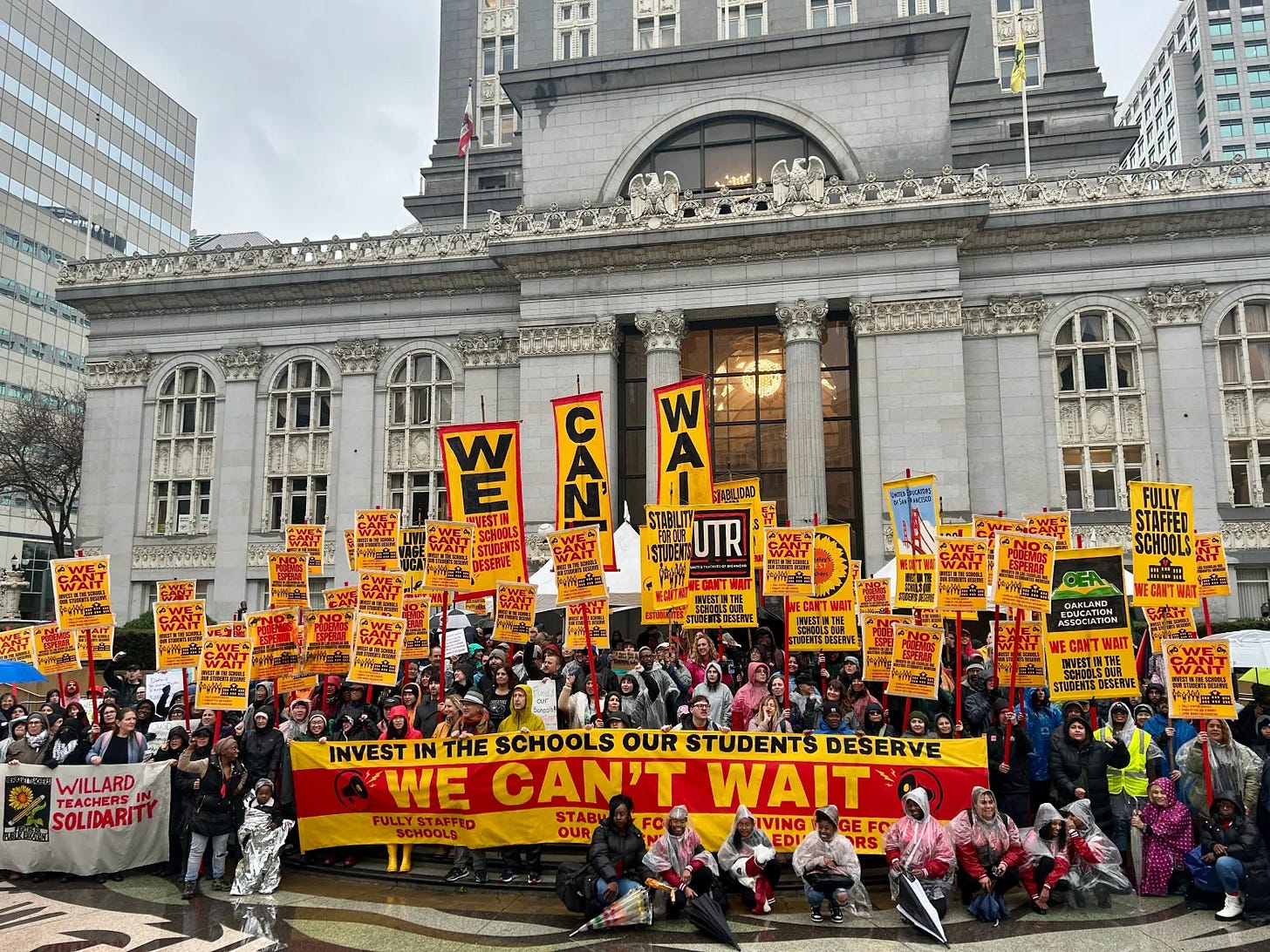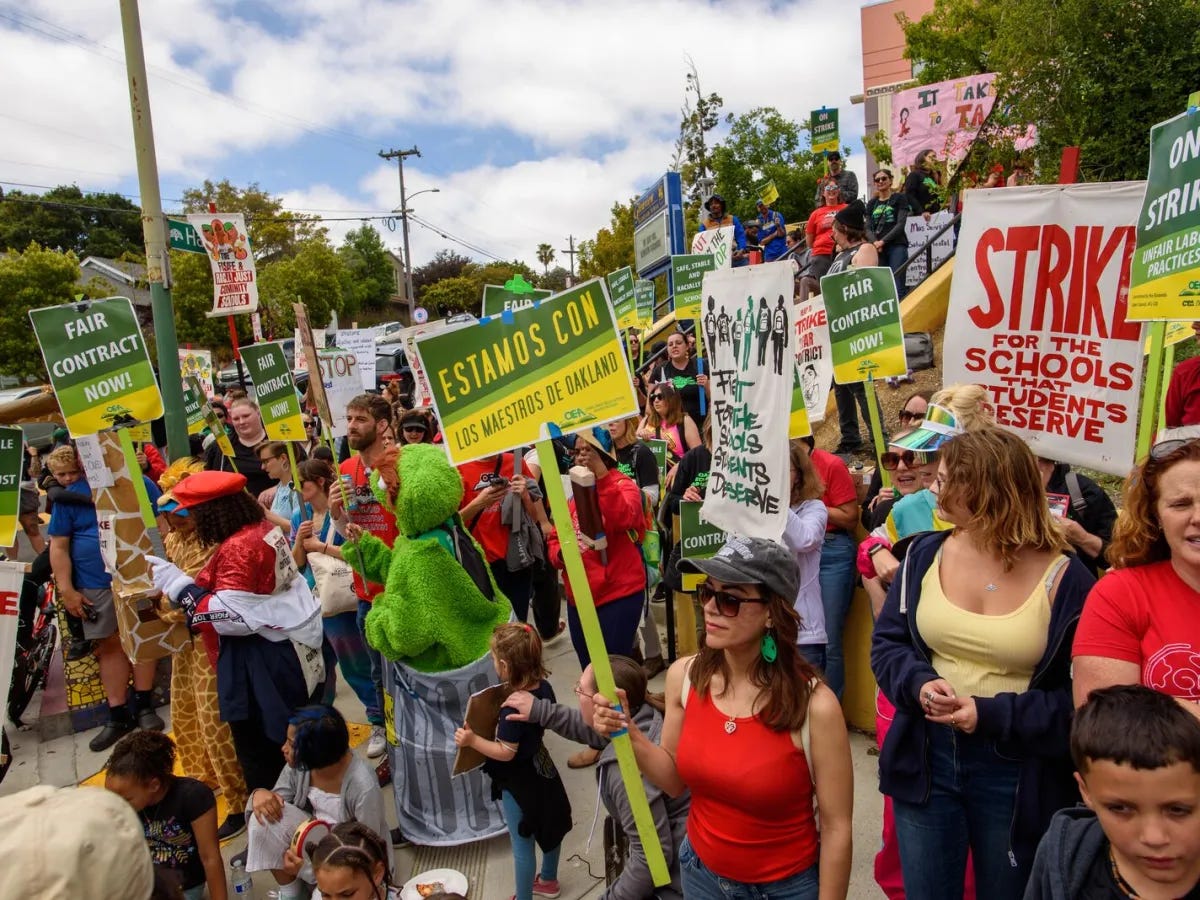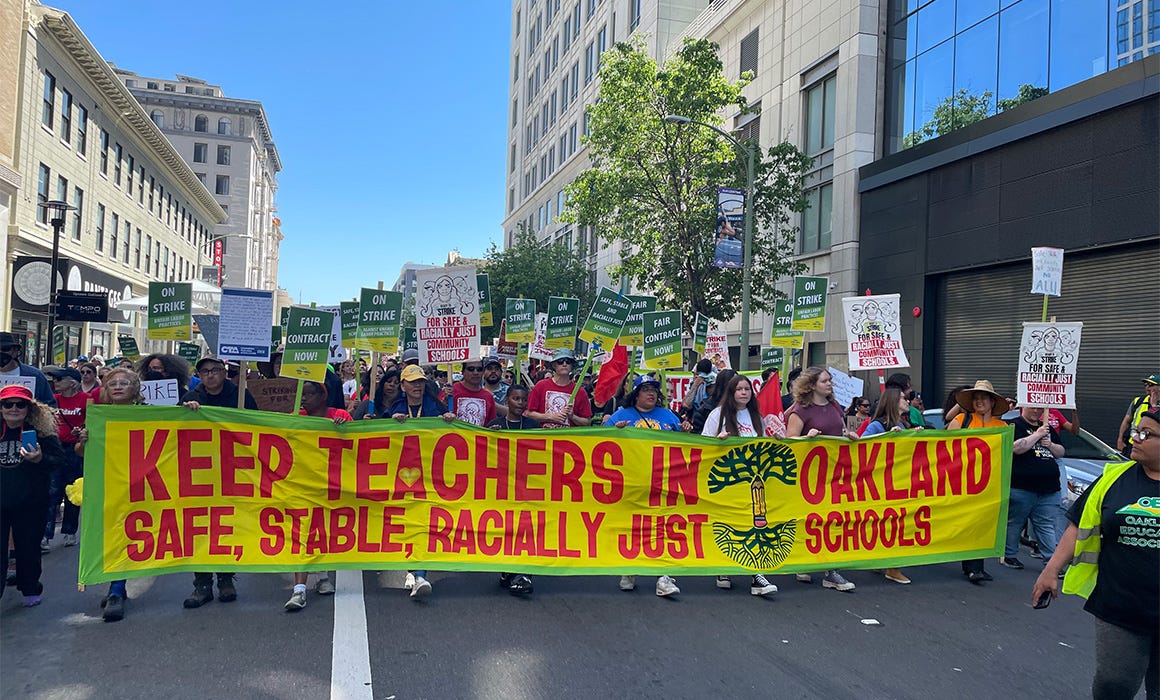Oakland Educators Organizing Immigrant Defense
This interview features three leaders from the Oakland Education Association (OEA) – Vilma Serrano, the Treasurer and Bargaining Chair of OEA, Michael Rodriguez, an ELD Middle School Teacher and member of the Bargaining Team, and Jessie Pappalia, an Elementary Newcomer Teacher Leader and Chair of the Newcomer Committee in OEA. The following interview has been edited for length and clarity.
Jeff Rosenberg (JR): You all have been on the frontlines to defend immigrant communities against ICE, especially in our public schools. We want to speak today about how you took on this work, what it looks like, and how others can learn to do the same within their schools and workplaces.
We have seen ICE escalating their raids, breaking the law, all across the country – violently arresting our immigrant neighbors and coworkers. What’s been the situation in Oakland since the start of Trump’s second term and what has it meant for your students, families, and coworkers?
Jessie Papalia (JP): It’s been terrifying for everyone. Since day one, especially after the January 20th inauguration, things changed fast. ICE overturned their previous policies, so schools, churches, and hospitals were no longer “safe spaces.” That alone sent shockwaves through the community.
What’s scarier is the lawlessness. We lead “Know Your Rights” trainings, but ICE just ignores basic rights now. Every week brings a new tactic and unprecedented activity from ICE. Just showing up to a court date can suddenly be the most dangerous thing you do. It’s chaos. It’s fear. And it changes constantly.
Michael Rodriguez (MR): And that’s on top of the trauma and many obstacles families already live with. So many of my students came here after facing real horrors just to get to the U.S.. And now, they carry this new fear – “Will Dad make it out of his appointment?” “Will Mom be home when I get back from school?” These kids shouldn’t have to live like this on top of the challenges they already had before.
JP: My degree is in language and literacy, not immigration law. But families are coming to us with ICE documents, hearing notices, scam phone calls, or situations where one child is on a different legal case than the parent. I didn’t know how to help at first. That’s why we’ve worked to build a trained rapid response team in our union – people at each school site who can respond and connect families to resources. It’s now part of our job as educators.
JR: Some people out there still say immigration isn’t a labor issue, skeptical of taking on these kinds of fights. How do you respond to that within the union?
Vilma Serrano (VS): Everything we’ve done is rooted in organizing our members first. That’s where political work has to start. We built a culture where members trust that fighting beyond the contract matters, bringing in “common good” demands. It began in 2019 when we fought against school closures and for newcomer students, meaning immigrant students recently arrived to the states. We were the first union in California to bargain newcomer issues into our contract. These weren’t side projects, but central to our work. The thousands of conversations we had to build that fight all laid the groundwork for this.
Students come to school carrying trauma from all the issues they face in their lives – poverty, displacement, housing insecurity – and now immigration raids. We see that in the classroom every day. So yes, these are workplace issues. We look to history as a guide here too. We could see labor experience and support was critical for the Civil Rights movement too. We feel that same obligation today too.
And our members know it. Michael and Jessie were the ones who pushed us to do more back in February. The idea was to fundraise for legal defense, but once ICE escalated, it became clear we needed a full rapid response network to meet the moment. Now we are preparing for how things may continue to escalate in the Fall.

JP: This is absolutely a labor issue. LA raids were workplace raids. And even beyond that – our members live in communities under attack. If labor turns inward, we weaken ourselves. Trump wants us to think this isn’t our issue. That’s how we lose our power not just as a union, but how we lose power as a working class. That’s how he wins. We need solidarity. All of us need to be asking ourselves if we are ready to step in and get involved in this fight before it’s too late.
JR: Can you explain what it took to win the sanctuary language in your current contract?
MR: We won it by striking. Let’s be real. Power listens to unity, and we stood together. As a public sector union, we’re less vulnerable than nonprofits or private companies to retaliation. As a working class institution, we have an obligation to fight this. Trump can’t pull our funding – we fund ourselves through membership dues. So labor has a responsibility to lead this fight as working class organizations with some real independence.
That contract language matters. It’s our protection. We’ve added sanctuary policies into our contract, made schools safer, and pushed for policies that meet students’ actual needs, like creating newcomer educator roles that didn’t exist before. Beyond facing these immediate threats, we want to strive to make sure all of our students can thrive here.
VS: Before 2019, we didn’t even have Jessie’s role – an elementary newcomer teacher lead. Now we do. Then in 2022-23, we pushed for more, but instead got a joint district-union committee on newcomer supports, which Jessie chairs. That’s helped shape real policy – like revising ICE response protocols and pushing the district to fill gaps. We didn’t get everything, but it’s built a foundation to work from that we are continuing to fight on now.
JR: This kind of network isn’t built overnight, but takes real work. How did the rapid response network come together in practice?
JP: It started after an ICE threat outside a family’s home. We had a long meeting with the district and realized how unprepared they were. Then we saw how overwhelmed local immigrant justice organizations were – many are under-resourced or even facing lawsuits. There was a real need for labor to step in to fill those gaps. As ICE continues to escalate, we needed to continue to evolve our tactics to the reality on the ground.
So we got to work. First I just talked to coworkers at my school. We had five people at the first meeting. Then we asked the union for support, got it approved by leadership, and kept growing. At first I thought we’d try to get 9 people involved. We now have over 55 members on the team, 30 of whom regularly attend meetings.
They have played roles and contributed in a wide variety of ways. That group worked hard and raised $50,000 for legal defense early on. We have subcommittees and trained responders across the area ready to deploy. And we meet everyone where they are – not everyone can be at a raid site, but they can organize, fundraise, translate, or support in other ways.
VS: As a union member, it can start with talking to union leadership. It really started with members asking, “Who else is worried about this?” Start there. Talk to friends. Build from that concern into collective action. Try to understand what needs there are in the community and what people are already doing on the ground.
Any union can start by demanding better policies from their employers. You might not have the capacity to build a full rapid response team, but you can demand workplace protections. You can make sure undocumented coworkers are supported. That’s a starting point for everyone.
JR: This kind of organizing takes deep connection and trust with the community. Community partnerships have also become a very critical piece of educator union campaigns centered around bargaining for the common good and bringing community support behind the union’s demands. What has it looked like to build trust and community partnerships in this work?
JP: We’ve learned a lot. We work closely with legal organizations who’ve done defense work for decades, but they don’t know each student or family the way a teacher does. And we’ve brought something new to this work through our deep and daily connection to families. Schools reach every corner of a city, and that’s powerful. Some organizations struggle to get the word out. We can help with that, and they’ve appreciated it.
We see parents every day. We’re in constant contact. And because we’re in every neighborhood, schools are uniquely positioned to build that trust and spread information quickly. We are connected with every single child ages 3 to 18 in Oakland. The same is true for teachers in Chicago, New York, Los Angeles, and on.
It hasn’t always been easy – working with the city, navigating politics and coalitions – it’s a learning curve. But these relationships make our union stronger. When we strike, families have our back. When they’re in crisis, we have to have theirs too.
MR: That trust is everything. We get phone calls – “Hey, this happened. What do I do?” They trust us more than they trust administrators or city officials. And we’ve had to teach some hard things. I’ve done “Know Your Rights” trainings for middle schoolers and helped families prepare in case a parent doesn’t come home.
They know that if they have a problem they can call me for help. It’s heartbreaking, but necessary. We could only build that trust by proactively showing them we care and will support them no matter what.
JR: Across California right now, we have seen escalations by ICE, especially with the recent events in LA where communities are fighting back. What do you make of these recent events?
VS: I was in LA when the raids happened in June. It was disgusting – broad daylight, massive shows of force, mass arrests of ordinary people. But the response from the people? Incredible and inspiring. Neighbors, workers, just every day people – everyone showed up and stopped it because it was just so grotesque. There was a disgusting narrative during Trump’s campaign, talking about how they would go after immigrants, but everyone can see these are just working people they are criminalizing and demonizing to protect their profits.
That’s the power we need to sharpen everywhere. And unions have a role to play. We can mobilize for mass actions, ensure safety, and help organize deeply. We can build broadly with the community to have the power we need to take this on.
MR: LA was targeted. It felt deliberate. They picked a city with strong organizing and tried to crush it. But people fought back. And the truth is, every raid impacts more than just one person. Take a father, sole provider, detained – his family is left with nothing. No food, no income. There’s room for everyone to support: rides, food delivery, legal referrals. That keeps us going.
JR: We’re also seeing new tactics and escalation – National Guard deployment, facial recognition, local police working with ICE. What do you think this all means for how we should be responding to keep up?
VS: The repression we’re seeing is real. This is a moment for resilience and unity. We need to use our union organizing skills – bargaining, planning, strategic conversation – and apply them here. Winning the policies and contract language we can use to protect our people. That means unions standing up, together, and not backing down. We need to protect our students, our coworkers, and our communities – not just in the classroom, but in the streets too.
MR: So many of the ICE agents are literally bounty hunters and bail bondsmen doing enforcement, so we shouldn’t be surprised by their abuses in the end. They don’t know people’s rights or really care. ICE uses them to stay clear of lawsuits. By the time you fight it, the person is already deported. It shows they will try whatever they can.
Even in the face of all of this, remember, don’t give up. We’ve weathered worse. We’ll weather this too. The kids need us. The community needs us. We’re all in this together. And together, we can win this.







